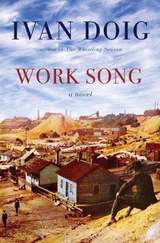With the coming of winter things got steadily worse, week by week. Working down in the station, Daniel saw less and less of actual daylight, but that wasn’t so different from going to school during the darkest months of the year. The worst of it was the cold. The dorms leaked so badly that from the middle of November on it was hard to sleep, the cold was that intense. Daniel slept with two older men who worked the same shift at the station, since people in general objected to the smell of the bugs they all swore they could smell on themselves. One of the men had a problem with his bladder and wet the bed sometimes while he was asleep. It was strange having the same thing happen again here with grown men that had happened during the pipeline crisis with the twins.
He began having trouble with his digestion. Even though he was hungry all the time, something had happened to his stomach acids so that he constantly felt on the verge of throwing up. Other people had the same problem, and blamed it on the Big Macs, which the guards delivered to the dorm half-frozen. Daniel himself believed it was psychological and had to do with his job at the station. Whatever the reason, the result was that he was always at odds with his body, which was cold and weak and nauseous and would fumble the simplest task, turning a doorknob or blowing his nose. And it stank, not just at the crotch and the armpits, but through and through. He began to hate himself. To hate, that is, the body he was attached to. He hated the other prisoners just as much, for they were all in more or less the same falling-to-pieces condition. He hated the dorms, and the station, and the frozen ground of the compound, and the clouds that hung low in the sky, with the weight of the winter within them, waiting to fall.
Every night there were fights, most of them inside the dorms. The monitors, if they were watching, seldom tried to intervene. They probably enjoyed it the way the prisoners did, as sport, a break in the monotony, a sign of life.
Time was the problem, how to get through the bleak hours at work, the bleaker hours at the dorm. Never mind the days and weeks. It was the clock, not the calendar, that was crushing him. What to think of in those hours? Where to turn? Barbara Steiner said the only resources are inner resources, and that so long as you were free to think your own thoughts you had as much freedom as there is. Even if Daniel could have believed that, it wouldn’t have done him much good. Thoughts have got to be about something, they’ve got to go somewhere. His thoughts were just loops of tape, vain repetitions. He tried deliberately daydreaming about the past, since a lot of the prisoners swore that your memory was a regular Disneyland where you spend days wandering from one show to another. Not for Daniel: his memory was like a box of someone else’s snapshots. He would stare at each frozen moment in its turn, but none of them ever came alive to lead the way into a living past.
The future was no better. For the future to be interesting your desires, or your fears, must have a home there. Any future Daniel could foresee back in Amesville seemed only a more comfortable form of prison which he could neither wish for nor dread. The problem of what he would do with his life had been with him for as many years as he could remember, but there had never been any urgency about it. Quite the opposite: he’d always felt contempt for those of his school-fellows who were already hot on the scent of a “career.” Even now the word, or the idea behind it, seemed blackly ridiculous. Daniel knew he didn’t want anything that could be called a career, but that seemed perilously near to not wanting a future. And when people stopped having an idea of their future after Spirit Lake, they were liable to let go. Daniel didn’t want to let go, but he didn’t know what to hang on to.
This was his frame of mind when he began reading The Bible. It served the essential purpose of passing time, but beyond that it was a disappointment. The stories were seldom a match for the average ghost story, and the language they were told in, though poetic in patches, was usually just antiquated and obscure. Long stretches of it made no sense at all. The epistles of St. Paul were particularly annoying that way. What was he to make of: “Beware of dogs, beware of evil workers, beware of the concision, for we are the circumcision, which worship God in the spirit, and rejoice in Christ Jesus, and have no confidence in the flesh, though I might also have confidence in the flesh.” Gobbledegook! Even when the language was clearer, the ideas were murky, and when the ideas were clear they were usually dumb, like the dumb ideas of Reverend Van Dyke but without his sense of humor. Why did serious people ever take it seriously? Unless the whole thing was a kind of secret code (this was Bob Lundgren’s theory), which made completely good sense when you translated it from the language of two thousand years ago to the language that people spoke today. On the other hand (this was Daniel’s theory) what if St. Paul was talking about experiences that nobody had any more, or only people crazy enough to believe that black was white, and suffering some kind of medicine, and death the beginning of a better kind of life? Even then it was doubtful if believers believed in all they said they did. More likely they’d taken Van Dyke’s advice and were brainwashing themselves, saying they believed such stuff so that some day they actually might.
But he didn’t believe it, and he wouldn’t pretend that he did. He only kept reading it because there was nothing else to read. He only kept thinking about it because there was nothing else to think about.
By the first snowfall, in mid-November, Barbara Steiner was very pregnant and very depressed. People began avoiding her, including the men she’d been having sex with. Not having sex meant she wasn’t getting as many Big Macs as usual, so Donald, who’d been having stomach trouble, would often let her share his, or even give her the whole thing. She ate like a dog, quickly and without any sign of pleasure.
All the talk had gone out of her. They would sit cross-legged on her rolled-up bedding and listen to the wind slam against the windowpanes and rattle the doors. The first full-scale blizzard of the year. Slowly it buttressed the leaky walls with snowdrifts, and the dorm, so sealed, became warmer and more bearable.
There was such a feeling of finality somehow, as though they were all inside some ancient wooden ship that was locked into the ice, eking out rations and fuel and quietly waiting to die. Cardplayers went on playing cards as long as the lights were on, and knitters would knit with the wool they had knit and unraveled a hundred times before, but no one spoke. Barbara, who had already been through two winters at Spirit Lake, assured Daniel that this was just a phase, that by Christmas at the latest things would get back to normal.
Before they did, though, something quite extraordinary happened, an event that was to shape the rest of Daniel’s life — and Barbara’s as well, though in a far more terrible way. A man sang.
There had been less and less music of any sort lately. One of the best musicians at Spirit Lake, a man who could play just about any musical instrument there was, had been released in October. A short time later a very good tenor who was serving twelve years for manslaughter had let go, walking out beyond the perimeter early one Sunday morning to detonate the lozenge in his stomach. No one had had the heart, after that, to violate the deepening silence of the dorms with songs unworthy of those whom they could all still clearly call to mind. The only exception was a feeble-minded migrant woman who liked to drum her fingers on the pipes of the Franklin stove, drumming with a stolid, steady, rather cheerful lack of invention until someone would get fed up and drag her back to her mattress at the far end of the dorm.
Читать дальше












